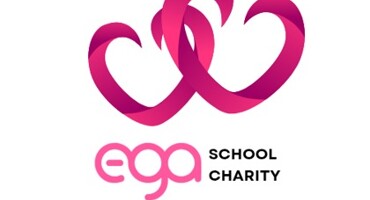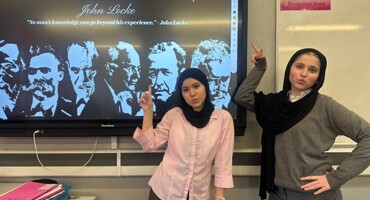 Posted on: 27/11/2025
Posted on: 27/11/2025Pastoral
EGA Pastoral Curriculum Intent 2025-2026
Our priority in 2024-25 is ensuring that every student experiences a consistent curriculum entitlement where all students can achieve without limits.
Our pastoral curriculum is an entitlement for every student. It both celebrates the diversity of our communities and gives students access to the knowledge, skills and experience necessary to develop a rich and broad understanding of the world. Recognising the strengths and needs of the individual is at the core of our school; this ensures that all students can and do achieve both academically and personally. We believe that students should leave EGA having achieved more than they ever believed possible and with the experience, resilience and confidence to help them to become leaders of their own lives and their wider community.
To support this aim, our pastoral curriculum must:
Build social capital, excellent character skills and expose our students to knowledge and experiences they may not have access to outside of school, but also value the diversity of our school community.
-
Recognise and promote enrichment outside the classroom as an entitlement for all our students.
-
Develop students who are leaders, ready to take their place in society, who will prosper and share their success with their communities.
-
Support the development of character through nurturing a set of positive personal traits, dispositions and virtues that act as a foundation for their motivation and conduct providing space for the resilience and integrity that is essential for them to flourish in later life.
-
Raise aspirations and encourage pupils to make appropriate choices and understand what they need to reach and succeed in their chosen careers.
-
Value and celebrate the diversity that is the foundation of our school community.
-
Build students’ tacit knowledge by giving access to social and cultural experiences they may not otherwise have access to.
-
Provide meaningful links with the world of work.
-
Actively encourage students to participate in enrichment activities that provide breadth and enjoyment for all students and also nurture the talents of individuals.
-
Teach the learning habits and behaviours that will allow students to become effective independent learners (our expectation of 100% engagement).
Curriculum Model
Our pastoral curriculum is key for ensuring our students, who come from a diverse background, many with challenging circumstances are exposed to a variety of experiences and environments. As such, the pastoral curriculum seeks to redress any imbalance, offering equity in terms of access and frequency.
It consists of four strands:
Personal Character Development
-
Developing responsible, respectful and active citizens who are able to play their part and become actively involved in public life as adults
-
Promoting the extensive personal development of pupils ensuring pupils have access to a wide, rich set of experiences.
-
Supporting pupils to be confident, resilient and independent young women.
-
Developing pupils’ character, through a set of positive personal traits, dispositions and virtues that informs their motivation and guides their conduct so that they reflect wisely, learn eagerly, behave with integrity and cooperate consistently well with others. This gives pupils the qualities they need to flourish in society
-
Developing pupils’ confidence, resilience and knowledge so that they can keep themselves mentally healthy
-
Promoting equality of opportunity so that all pupils can thrive together, understanding that difference is a positive, not a negative, and that individual characteristics make people unique
-
Encouraging a sense of enjoyment and fascination in learning about themselves, others and the world around them
-
Nurturing the ability to recognise the difference between right and wrong and to readily apply this understanding in their own lives,
-
Facilitating an interest in investigating and offering reasoned views about moral and ethical issues and ability to understand and appreciate the viewpoints of others on these issues.
Social Character Development
-
Giving opportunities for the use of a range of social skills in different contexts, for example working and socialising with other pupils, including those from different religious, ethnic and socio-economic backgrounds
-
Encouraging a willingness to participate in a variety of communities and social settings, including by volunteering, cooperating well with others and being able to resolve conflicts effectively.
-
Ensuring pupils know how to discuss and debate issues and ideas in a considered way.
-
Providing pupils with meaningful opportunities to understand how to be responsible, respectful, active citizens who contribute positively to society.
-
Ensuring that student voice and leadership opportunities are open to all students in order to represent their cohort and community.
Cultural Character Development
-
Giving students opportunities to develop an understanding and appreciation of the wide range of cultural influences that have shaped their own heritage and that of others
-
Ensuring students understand and appreciate the range of different cultures in EGA and further afield as an essential element of their preparation for life in modern Britain
-
Nurturing the ability to recognise, and value, the things we share in common across cultural, religious, ethnic and socio-economic communities.
-
Supporting students to engage with views, beliefs and opinions that are different from their own in considered ways.
-
Promoting equality and diversity effectively resulting in girls understanding, appreciating and respecting differences in the world and its people, celebrating the things we share in common across cultural, religious, ethnic and socio-economic communities.
-
Providing coherently planned rich opportunities for pupils to develop their talents and interests developing a willingness to participate in and respond positively to artistic, musical, sporting and cultural opportunities
Raising Aspirations
-
Providing an effective careers programme (see careers document for more detail) through unbiased careers advice, work experience and contact with employers in order to encourage students to make positive choices and understand what they need to do to succeed in the careers they aspire to.
-
Supporting readiness for the next phase of education training or employment so that pupils are equipped to make the transition successfully.
-
Equipping students with the skills and behaviours they need to live healthy lives, build positive relationships and be effective leaders of themselves, their communities and in whatever career they choose to pursue.
What does this look like in practice?
Our pastoral curriculum spreads across the traditional academic curriculum, led by departments such as PSHE and Citizenship. It is also delivered through tutor times, Thought for the Week, assemblies, careers education, our equality and diversity work, super curriculum drop days, our interventions offer and extra curricular activities.
Opportunities are open to the entire student body, with some specific activities targeted towards focused groups of students accessing opportunities throughout the course of the academic year to ensure all students at EGA have equality of access to the four strands we deem as essential for developing the young women we serve. We review this annually to make sure it remains relevant to the context of our community and students.





